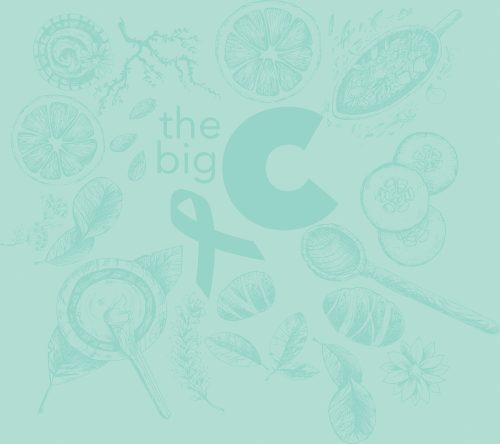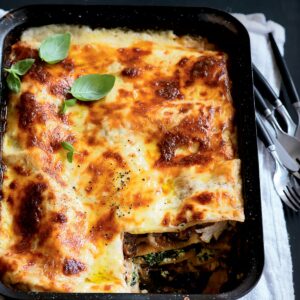
There’s no shortage of diets and food claims promising a cure for cancer – but how does the science behind them stack up?
There are many myths surrounding the relationship between food and cancer. Some of these can be harmful. We look at the evidence to ensure you receive the best nutrition possible throughout and beyond your treatment.
‘Sugar feeds cancer’
This myth is often harmful as it leads people to avoid all carbohydrate-containing foods, which can be counterproductive for anyone struggling to maintain their weight during treatment. Carbohydrates are broken down into sugars and are one of our body’s main sources of energy.
The theory suggests if cancer cells need sugar to thrive, then you should cut out carbohydrates and starve the cancer cells.
The science
Unfortunately, it’s not that simple. All our cells need glucose (sugar) for energy and when the body has no fuel from carbohydrates, it will break down fat and protein stores. This causes weight loss, fatigue and muscle weakness – all of which you want to minimise during treatment. Limiting foods with processed or added sugar is good for general health, but eliminating sugar won’t cure cancer.
‘Vitamin C infusions cure cancer’
Injections of high doses of vitamin C are thought to prevent or slow cancer growth by increasing the body’s ability to dispose of damaged cells. They are offered in New Zealand by some health professionals with a focus on complementary health – that is, alongside conventional treatment (surgery, radiotherapy, chemotherapy).
The science
While animal studies suggest a potential benefit, there is currently no evidence vitamin C infusion cures cancer in humans. Some patients report better energy levels and pain management after infusions, prompting further study. One such study is in the early stages at the University of Otago, led by Centre for Free Radical Research principal investigator Margreet Vissers. This study aims to determine whether vitamin C infusions will benefit cancer patients and what dose is required. If you are considering vitamin C infusions, discuss this with your oncology team to ensure it won’t interfere with your current treatment.
‘Artificial sweeteners cause cancer’
Artificial sweeteners (sugar substitutes) such as aspartame and saccharin, commonly found in diet drinks, were once thought to cause cancer in any amount consumed.
The science
This myth has been around for a while and was based on poorly designed animal studies which have been highly criticised by the scientific community. It has since been shown by thorough scientific research that artificial sweeteners are safe for consumption and do not cause cancer.
‘Red meat causes cancer’
Eating red meat may increase your risk of some cancers; however, an increased risk is not necessarily a cause.
The science
Eating a lot of processed meat (bacon, ham, sausage) and red meat has been shown to be associated with increased risk of bowel cancer and possibly stomach and pancreatic cancer. The exact reason is still being researched. Lean red meat is an important source of iron, protein, zinc and vitamin B12. To balance the risk with these benefits, the Ministry of Health recommends limiting or avoiding processed meat and eating less than 500g of cooked lean red meat per week (which is around 750g when raw). Try having meat-free nights, and keep your portion no larger than the palm of your hand. It is still unclear whether burnt or charred meats increase the risk of cancer in humans; however, it is recommended you don’t blacken meat on the grill.
‘A juice cleanse or detox cures cancer’
Some claims suggest extracting juice out of fruit and vegetables (juicing) and drinking this instead of eating the whole fruit or vegetable can rid your body of toxins and even prevent cancer.
The science
This myth neglects to acknowledge our body already has an effective detox system – our liver, kidneys and lungs. Drinking only fruit and vegetable juices can lead to headaches, low energy levels and weight loss from lack of balanced nutrients (protein and carbohydrates) and decreased kilojoule intake. You may also lack fibre, which is often removed in the juicing process. Fibre is important for bowel function and may have a protective effect for some cancers. Eating fruit and vegetables in their whole form ensures we gain all the nutrition they have to offer.
‘Vegetarian diets prevent cancer’
Due to some confusion about animal products and their effect on cancer, such as red meat mentioned previously, some people claim that a vegetarian diet is best for cancer prevention.
The science
Vegetarian diets tend to be high in plant-based foods such as fruit, vegetables, nuts and seeds. These foods provide fibre, vitamins and minerals, which benefit immune function, heart health and general well-being. It is acceptable to suggest vegetarian diets may help lower your risk of some cancers. However, these benefits can be enjoyed by non-vegetarian diets that include plenty of vegetables and fruit and limit processed meats and saturated fats.
‘Superfoods cure cancer’
Perhaps one of the most common claims about superfoods is that they have super powers and can be used alone to fight cancer.
The science
’Superfood’ is a marketing label given to foods higher in specific nutrients (vitamins, minerals, antioxidants) than others. Examples include blueberries, broccoli and raspberries. They can be a wonderful addition to your diet, but there is no evidence superfoods alone will prevent or cure cancer.
What about miracle diets?
The internet is full of misleading websites claiming their ‘miracle diet’ will cure cancer. Examples include alkaline, raw food and ketogenic diets. What they fail to mention in their claims are the finer details, notably the lack of robust scientific evidence and that they can be expensive, stressful and, in many cases, harmful. Most of these diets are based on anecdotal stories from people claiming theirs cured their cancer. But we do not know their medical history or whether they’ve had other treatments. Many of these diets are restrictive, cutting out entire food groups and risking vitamin and mineral deficiencies, poor immune function and a reduced quality of life. If you have heard of a diet that raises questions or you want to know more about, talk to your medical team.
What’s the bottom line?
A balanced, nutritious diet will help you to keep as well as possible and cope with the side effects of treatment. A registered dietitian can be one of your best sources of information.
What about food for cancer prevention?
The same healthy-eating advice still holds true – eat a wide variety of fruit and vegetables, include wholegrains, and limit unhealthy fats (saturated and trans fats) and sugary, processed food and beverages with limited nutritional value.
Tips for managing side effects
Nausea
- Eat upright
- Eat small amounts often
- Keep areas ventilated
- Eat cold or bland foods
- Avoid fatty, greasy and spicy foods
Reduced appetite
- Eat high-protein foods first
- Eat small amounts often
- Drink between meals, not with meals
- Eat the most when you feel hungriest
- Keep food around the house to remind you to eat
- Sip on high-calorie drinks such as juice, milk or a smoothie
- Try walking to stimulate appetite
Constipation
- Eat high-fibre foods such as wholegrains, vegetables, fruit
- Drink eight glasses of fluids per day
- Exercise as you’re able
Diarrhoea
- Eat small amounts often
- Aim for eight glasses of fluid to prevent dehydration
- Avoid greasy, fried, gas-producing foods, plus alcohol and caffeine
- Rice, bananas and apples may help after an acute bout
Taste changes
- Season food with garlic, lemon juice, herbs and spices
- Marinate meats
- Include gravies and sauces
- If you have a metallic taste, try sucking on mints or citrus fruit, rinsing your mouth before eating, and using plastic utensils
Advice for carers
- Ask the person if they feel like talking.
- Focus on listening rather than planning what to say next.
- Allow the person with cancer to feel sad or angry. You don’t have to keep them happy all the time – acknowledge their emotions: “I can see you are very upset/scared.”
- Avoid trying to give advice or find a solution.
- You are allowed to say things like, “I’m not sure what to say” or “I find this difficult to talk about”. Being honest invites open conversation.
- Silence may be appropriate.
- It’s okay to laugh. Don’t be shocked if they make jokes about cancer. It may be how they cope.
- Be realistic about what you can do.
- Try not to discuss medical matters or other people’s cancer histories. It’s not always useful to say, “I know how you feel”.
Reduce your risk
We can’t change some risk factors for cancer, such as our ethnicity, genetics or age, but we can choose what we eat, be smoke-free, be sun-smart and maintain an active lifestyle. These basic lifestyle changes can lower cancer risk and also protect against other chronic diseases, such as diabetes, cardiovascular (heart) disease and stroke.
Healthy lifestyle tips to reduce your risk of cancer:
- Maintain a healthy body weight.
- Be physically active as part of everyday life.
- Be smoke-free.
- Eat a healthy, balanced diet.
- Avoid sugary drinks and processed sugary foods.
- Limit alcoholic drinks to a maximum of two a day for men and one a day for women.
- Be sun-smart – slip, slop, slap and wrap.
- Visit your GP if something doesn’t feel right – it could save your life.
Recommended websites
- The Cancer Society of New Zealand cancernz.org.nz or call 0800 CANCER (226 237)
- Health Navigator NZ healthnavigator.org.nz
- Cancer Council Australia cancer.org.au
- Cancer Research UK cancerresearchUK.org
For more personalised support, contact your local Cancer Society and see what they can do for you.
Article sources and references
- Bingham SA et al. 2003. Dietary fibre in food and protection against colorectal cancer in the European Prospective Investigation into Cancer and Nutrition (EPIC): an observational study. Lancet 361:1496https://www.ncbi.nlm.nih.gov/pubmed/12737858
- Bouvard V et al. 2015. Carcinogenicity of consumption of red and processed meat. Lancet Oncology 16:1599-600https://www.ncbi.nlm.nih.gov/pubmed/26514947
- Campbell EJ et al. 2016. Ascorbate availability affects tumor implantation-take rate and increases tumor rejection in Gulo-/- mice. Hypoxia (Auckl) 8:41-52https://www.ncbi.nlm.nih.gov/pubmed/27800507
- Campbell EJ et al. 2016. Pharmacokinetic and anti-cancer properties of high dose ascorbate in solid tumours of ascorbate-dependent mice. Free Radical Biology & Medicine 99:451-62https://www.ncbi.nlm.nih.gov/pubmed/27567539
- Cancer Research UK. 2016. Food Controversies: Superfoods, cancerresearchuk.orghttps://www.cancerresearchuk.org/about-cancer/causes-of-cancer/diet-and-cancer/food-controversies
- European Food Safety Authority. 2013. Aspartame, efsa.europa.euhttps://www.efsa.europa.eu/en/topics/topic/aspartame
- Ministry of Health. 2015. Eating and Activity Guidelines for New Zealand Adults. Wellington: Ministry of Health.https://www.health.govt.nz/system/files/documents/publications/eating-activity-guidelines-for-new-zealand-adults-oct15_0.pdf
- World Cancer Research Fund and American Institute for Cancer Research. 2007. Food, Nutrition, Physical Activity and the Prevention of Cancer: A Global Perspective. Washington DChttps://www.wcrf.org/dietandcancer
www.healthyfood.com










